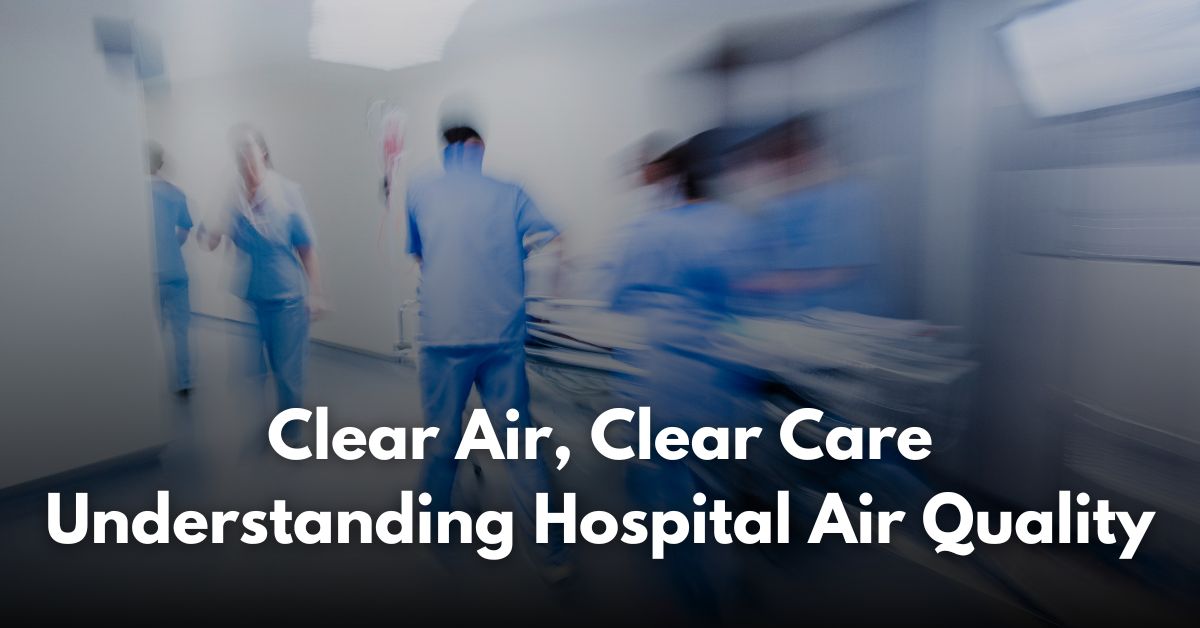
In the bustling environment of a hospital, countless factors contribute to patient care and recovery. Among these, air quality might not be the first thing that comes to mind, yet it plays a critical role in ensuring a safe and healthy environment for both patients and staff. This blog delves into why air quality in hospitals matters more than you might think.
The Importance of Air Quality in Hospitals
Infection Control
One of the most significant concerns in hospitals is the prevention of infections. Poor air quality can harbor airborne pathogens such as bacteria, viruses, and fungi, leading to hospital-acquired infections (HAIs). These infections can complicate patient recovery, extend hospital stays, and increase healthcare costs. Ensuring clean air is essential to minimize the risk of HAIs.
Vulnerable Populations
Hospitals cater to a wide range of patients, many of whom have weakened immune systems. Patients undergoing surgery, chemotherapy, or those with chronic illnesses are particularly susceptible to airborne contaminants. Maintaining high air quality standards helps protect these vulnerable populations from additional health complications.
Staff Health and Productivity
Hospital staff, including doctors, nurses, and support personnel, spend long hours in the facility. Poor air quality can lead to respiratory issues, allergies, and overall decreased well-being, affecting their ability to provide optimal care. A healthy work environment translates to better staff performance and patient outcomes.
Compliance with Regulations
Hospitals must comply with stringent air quality regulations set by health authorities and organizations. Failure to meet these standards can result in penalties, loss of accreditation, and damage to the hospital’s reputation. Investing in air quality management is not only a health imperative but also a regulatory necessity.
Common Air Quality Issues in Hospitals
Biological Contaminants
Bacteria, viruses, and mold spores can easily become airborne, especially in areas with high patient turnover. Operating rooms, intensive care units, and emergency departments are particularly susceptible.
Chemical Pollutants
Hospitals use a variety of chemicals for cleaning, disinfection, and medical procedures. These chemicals can release volatile organic compounds (VOCs) into the air, contributing to indoor air pollution and posing health risks to both patients and staff.
Particulate Matter
Construction activities, equipment maintenance, and everyday activities can generate particulate matter (PM) that degrades indoor air quality. These particles can penetrate deep into the lungs, causing respiratory and cardiovascular problems.
Improving Air Quality in Hospitals
Regular Maintenance of HVAC Systems
Heating, ventilation, and air conditioning (HVAC) systems play a crucial role in maintaining indoor air quality. Regular maintenance, including filter changes and system cleaning, ensures these systems function effectively in removing contaminants from the air.
Use of Air Purification Systems
Advanced air purification systems can significantly enhance air quality in hospitals. These systems are designed to remove a wide range of pollutants, including biological contaminants, chemical pollutants, and particulate matter.
Monitoring and Testing
Continuous monitoring of air quality helps identify potential issues before they escalate. Regular testing and assessments ensure that the hospital environment remains safe for both patients and staff.
Introducing IAPS: A Revolutionary Air Sterilizer
At the forefront of air purification technology is the Integrated Air Purification and sterilisation (IAPS), an advanced air sterilizer designed to meet the stringent air quality needs of hospital environments. IAPS employs cutting-edge technology to eliminate a wide range of airborne contaminants, ensuring a sterile and healthy atmosphere.
Key Features of IAPS:
- High-Efficiency Filtration: Removes particulate matter, including dust, pollen, and other pollutants.
- Advanced Sterilization: Uses UV-C light and other technologies to kill bacteria, viruses, and mold spores.
- Chemical Pollutant Removal: Effectively captures and neutralizes harmful VOCs.
- Smart Monitoring: Real-time air quality monitoring and automatic adjustments for optimal performance.
With IAPS, hospitals can ensure a safer environment for patients and staff, reducing the risk of infections and improving overall health outcomes. Investing in air quality is investing in the health and well-being of everyone within the hospital.
In conclusion, air quality in hospitals is a critical aspect of healthcare that demands attention. By understanding its importance and implementing advanced solutions like IAPS, hospitals can create a safer, healthier environment for all.

